| Srl | Item |
| 1 |
ID:
092465


|
|
|
|
|
| Publication |
2009.
|
| Summary/Abstract |
The use of force in international relations by the West is increasingly witnessing a greater reliance on Special Forces. This trend has profound implications for state action because Special Forces represent a very different kind of soldier and they possess the inherent ability to transgress traditional boundaries in peace and war. The development and participation of UK Special Forces in the Global War on Terror provides a microcosm of the positive and negative dimensions of using secret military units as the force of choice against insurgents and terrorists in Afghanistan, Iraq and indeed on the streets of London.
|
|
|
|
|
|
|
|
|
|
|
|
|
|
|
|
| 2 |
ID:
144333
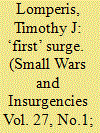

|
|
|
|
|
| Summary/Abstract |
In a military intervention, do surges work? I compare the failed ‘surge’ in Vietnam, the repulse of the Easter Invasion in 1972, as a means of assessing the more ambiguous surges in Iraq and Afghanistan. I identify four features of a surge for this analysis: the military dimensions and strategy of the surging forces, the military capabilities of the host forces, the political vitality and will of the host country, and the political commitment in the domestic politics of the intervener. I find that the last feature is the most critical; and, in all three surges, the American political commitment was lacking.
|
|
|
|
|
|
|
|
|
|
|
|
|
|
|
|
| 3 |
ID:
077028
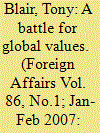

|
|
|
|
|
| Publication |
2007.
|
| Summary/Abstract |
The war on terrorism is not just about security or military tactics. It is a battle of values, and one that can only be won by the triumph of tolerance and liberty. Afghanistan and Iraq have been the necessary starting points of this battle. Success there, however, must be coupled with a bolder, more consistent, and more thorough application of global values, with Washington leading the way.
|
|
|
|
|
|
|
|
|
|
|
|
|
|
|
|
| 4 |
ID:
055403


|
|
|
| 5 |
ID:
077262


|
|
|
| 6 |
ID:
062962
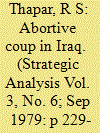

|
|
|
| 7 |
ID:
173831
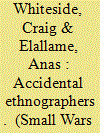

|
|
|
|
|
| Summary/Abstract |
The disillusionment with U.S.-led counter insurgent efforts to gain a deeper understanding of social dynamics in countries with extensive tribal structures has led to a rejection of programs aimed to improve cultural competency. The Islamic State movement does not share this perception, and its strategists blamed its early failures during the U.S. occupation on a flawed understanding of tribal dynamics. This paper traces the political, ideological, and structural changes the leaders of the Islamic State movement made to adapt its approach toward the Sunni tribes of Iraq and later Syria, in order to develop a deeper base of popular support for its caliphate project. The group’s study of the tribes was done by a new tribal engagement office that put into motion an ethnographic study of tribal networks in key areas. There is evidence that the inspiration for this change came from its opponents. The Islamic State movement used these new insights to win a greater level of influence in rural areas, which in turn influenced its success in 2014. This research supports the idea that insurgency and counterinsurgency success often depend on which side is best at the incorporation of cultural and societal knowledge into policy and strategy.
|
|
|
|
|
|
|
|
|
|
|
|
|
|
|
|
| 8 |
ID:
146360
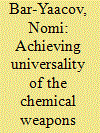

|
|
|
|
|
| Summary/Abstract |
A century ago, at Ypres, in Belgium, the use of chemical weapons in the First World War began. Ninety years ago, in Geneva, a protocol to ban the use of chemical weapons was signed. Two years ago, the attack on Ghouta, on the outskirts of Damascus, forced Syria’s accession to the Chemical Weapons Convention (CWC). A promise to eliminate Syria’s chemical-weapons stocks followed. Yet today, in Syria and Iraq, these abhorrent weapons continue to be used.
|
|
|
|
|
|
|
|
|
|
|
|
|
|
|
|
| 9 |
ID:
085436
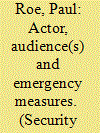

|
|
|
|
|
| Publication |
2008.
|
| Summary/Abstract |
The concept of securitization has produced a considerable amount of debate over the meaning of security. However, far less attention has been paid to the role of audiences and their relationship to actors in the securitization process. Informed by the work of Thierry Balzacq (2005), and through analysis of the decision of the UK government to join with the USA in the 2003 invasion of Iraq, in this article I show that although the general public can indeed play a valuable role in providing an actor with `moral' support concerning the `securityness' of an issue, more crucial, however, is the `formal' support provided by parliament concerning the `extraordinaryness' of the means necessary to deal with it. My argument is thus that securitization can in this way be seen as a distinct two-stage process marked by a `stage of identification' and a `stage of mobilization'
|
|
|
|
|
|
|
|
|
|
|
|
|
|
|
|
| 10 |
ID:
091297
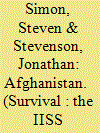

|
|
|
|
|
| Publication |
2009.
|
| Summary/Abstract |
US President Barack Obama's current policy favours escalation in Afghanistan. The idea is that as the United States' military presence in Iraq is drawn down, the use of force can be refocused on Afghanistan to forge a more viable state. The principal instruments of this policy are more American troops with better force protection (a customised version of the counter-insurgency 'surge' employed with ostensible success in Iraq) and firmer bilateral diplomacy with Pakistan. The administration's policy appears to be overdetermined. The premise of the policy is that the United States must 'own' Afghanistan in order to defend its strategic interests. But that premise begs the question of whether US strategic interests actually require the United States to assume the grand and onerous responsibility of rebuilding the Afghan state. They do not.
|
|
|
|
|
|
|
|
|
|
|
|
|
|
|
|
| 11 |
ID:
104786
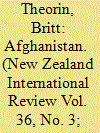

|
|
|
| 12 |
ID:
121997


|
|
|
| 13 |
ID:
149823
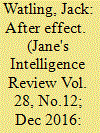

|
|
|
|
|
| Summary/Abstract |
Allied forces have begun the offensive to retake the northern Iraqai city of Mosul from the Islamic State. Reporting from Iraq, Jack Watling analyses how the successful recapture of the city will effect broader political and sectarian dynamics in the country.
|
|
|
|
|
|
|
|
|
|
|
|
|
|
|
|
| 14 |
ID:
070997
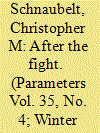

|
|
|
| 15 |
ID:
123104
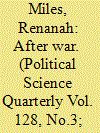

|
|
|
|
|
| Publication |
2013.
|
| Summary/Abstract |
RENANAH MILES examines recent stabilization and reconstruction missions in Afghanistan and Iraq. She analyzes persistent shortfalls in the ability of the State Department and the U.S. Agency for International Development to conduct these missions. She contends that organizational culture and bureaucratic turf wars undermine civilian leadership and encourage the military to compensate in its absence.
|
|
|
|
|
|
|
|
|
|
|
|
|
|
|
|
| 16 |
ID:
073803
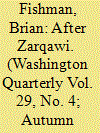

|
|
|
|
|
| Publication |
2006.
|
| Summary/Abstract |
Abu Musab al-Zarqawi's death deprived Al Qaeda in Iraq of its strategic leader. How his successor responds to the network's internal security dilemmas, penetration, and the lingering doctrinal impasse with Al Qaeda proper will determine the organization's future trajectory.
|
|
|
|
|
|
|
|
|
|
|
|
|
|
|
|
| 17 |
ID:
158652
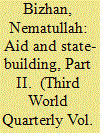

|
|
|
|
|
| Summary/Abstract |
Part I of this article found that, in South Korea and Taiwan, institutional legacy and continuity as well as the politics of aid did matter for post-war state-building. The inheritance and continuity of Weberian states and the receipt of aid either as budget support or increasingly aligned with local priorities helped to foster state-building. Part II of the study in this article explores a different dynamic of post-war aid to Afghanistan and Iraq which had a legacy of neopatrimonial and weak states. It argues that under more adverse initial conditions – for a neopatrimonial state – the role of aid regime and state-building strategies become even more important. Under these conditions, aid and state-building strategies may undermine state-building if they induce discontinuity in the existing state capacity and create parallel institutions to those of the state. Depending on the policies, state weakness may be reinforced if leaders are preoccupied with the politics of patronage.
|
|
|
|
|
|
|
|
|
|
|
|
|
|
|
|
| 18 |
ID:
051907
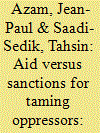

|
|
|
| 19 |
ID:
051067
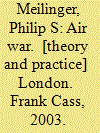

|
|
|
|
|
| Publication |
London, Frank Cass, 2003.
|
| Description |
x, 234p.
|
| Series |
Cass series: studies in air power
|
| Standard Number |
0714682667
|
|
|
|
|
|
|
|
|
|
|
|
Copies: C:1/I:0,R:0,Q:0
Circulation
| Accession# | Call# | Current Location | Status | Policy | Location |
| 048002 | 358.4/MEI 048002 | Main | On Shelf | General | |
|
|
|
|
| 20 |
ID:
106604


|
|
|
|
|
| Publication |
2011.
|
| Summary/Abstract |
This article sheds light on the identity and activities of foreign fighters who were active in Afghanistan and Pakistan between 2002 and 2006. This is done through analyzing a series of "martyr biographies"-short biographical stories of killed militants-issued by the Al Qaeda network in 2008. The study argues that there was little migration of foreign fighters from abroad to Afghanistan and Pakistan in this period, and practically no influx of fighters from Iraq. Al Qaeda's activities in the region were upheld by fighters who managed to flee from Afghanistan during and after the U.S.-led invasion in late 2001. After re-settling in the tribal areas of Pakistan, the main concern for these fighters was to fight a guerrilla war against U.S. and NATO troops in Afghanistan, not to plot terrorist attacks in Western countries. The study demonstrates that over time, the foreign fighters became more integrated in local communities. These early developments may help to explain why Al Qaeda continues to enjoy a strong sanctuary in the tribal areas of Pakistan today.
|
|
|
|
|
|
|
|
|
|
|
|
|
|
|
|